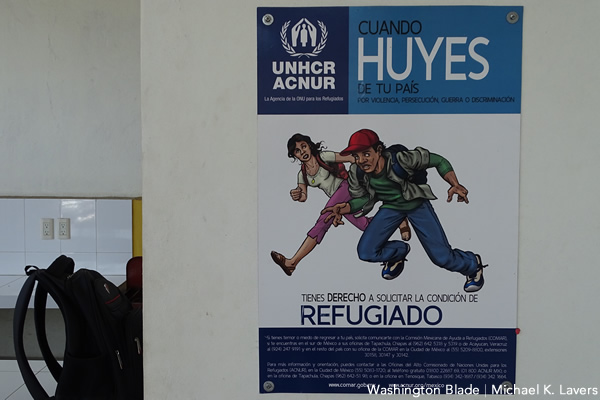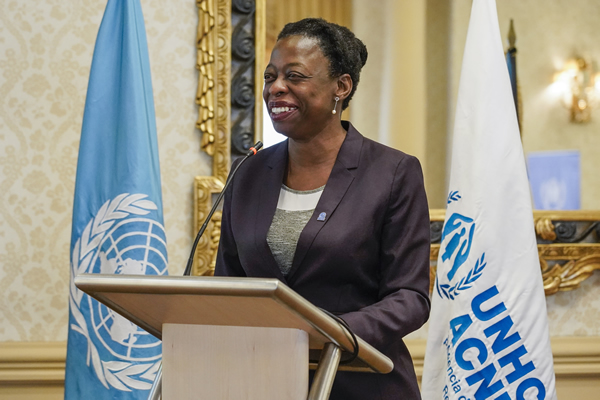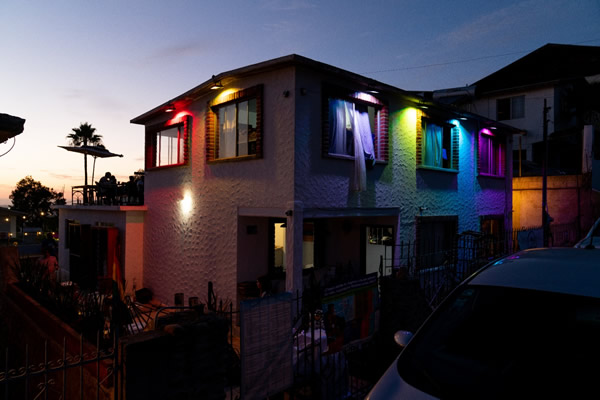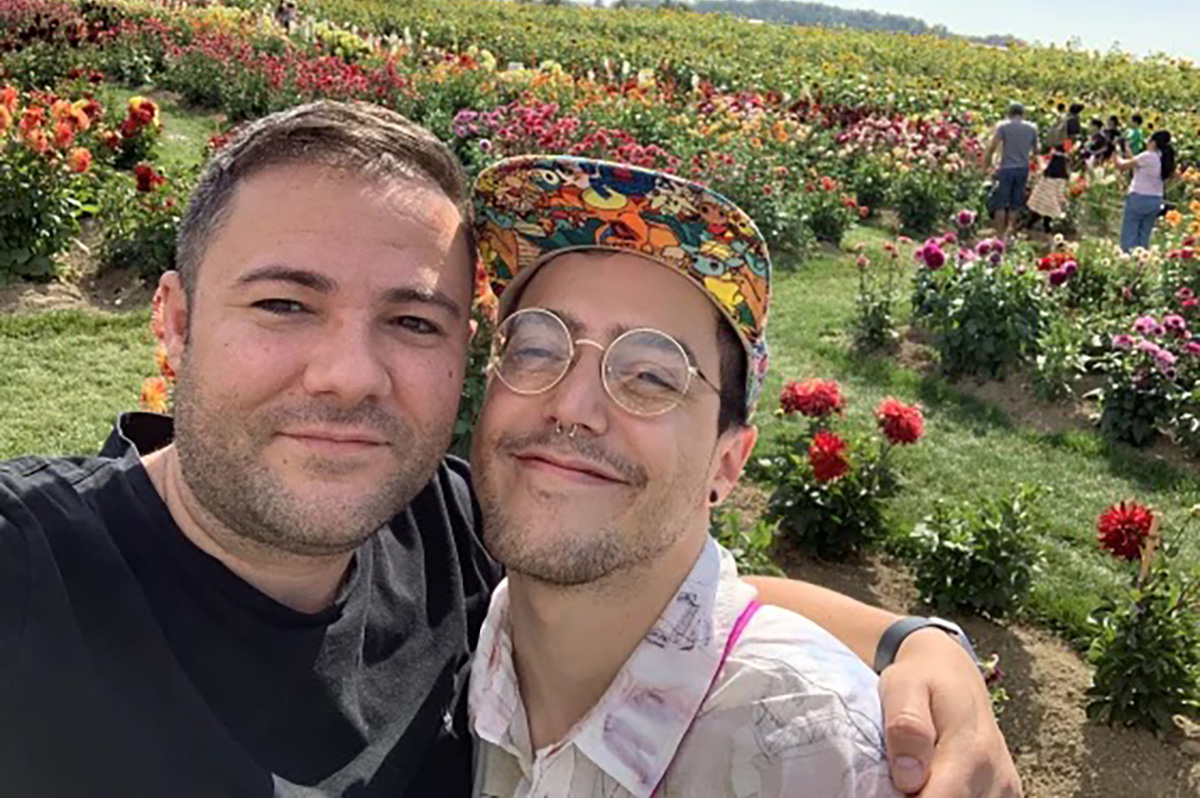World
UNHCR highlights work with LGBTQ asylum seekers in Central America
Agency adopted LGBTQ-inclusive non-discrimination policy in 2018

Officials with the U.N. Refugee Agency in Central America and Mexico say they remain committed to helping LGBTQ asylum seekers and migrants in the region.
UNHCR Guatemala Representative Besem Obenson told the Washington Blade during an interview at her Guatemala City office last September that she and her colleagues work with Asociación Lambda and other Guatemalan NGOs to provide LGBTQ asylum seekers with access to LGBTQ-friendly shelters, psychosocial care and other programs once they identify themselves as LGBTQ. Obenson said UNHCR also works with the Guatemalan government to improve the way it responds to an asylum seeker with an ID document that does not correspond to their gender presentation.
“Our role … is to strengthen the government’s response to refugees and asylum seekers,” said Obenson.

Rafael Zavala, a senior UNHCR official in El Salvador, echoed Obenson when he spoke with the Blade at UNHCR’s office in San Salvador, the Salvadoran capital, last July.
Zavala noted UNHCR has a formal partnership with COMCAVIS Trans, a Salvadoran transgender rights group. Zavala said UNHCR also works with two other LGBTQ groups — Aspidh Arcoíris Trans and Diké LGBTI+ — in a less official capacity.
“What we do is work at the community level to strengthen their role in communities,” Zavala told the Blade. “We also build for them safe spaces (to accept internally displaced people, migrants and deportees who are LGBTQ) and also find spaces where they can receive services, attention and legal assistance.”
Anti-LGBTQ violence among migration ‘root causes’
Vice President Kamala Harris and others have acknowledged anti-LGBTQ violence is one of the “root causes” of migration from Central America’s Northern Triangle that includes El Salvador, Guatemala and Honduras.
The Mexican Commission on Refugee Aid (COMAR) on Monday reported 27.7 percent of the 131,448 people who asked for asylum in Mexico in 2021 were Honduran.
The Justice Department notes 85,391 people asked for asylum in the U.S. in the 2021 fiscal year from Oct. 1, 2020, and Sept. 30, 2021. More than twice as many people asked for asylum in the U.S. during the 2020 fiscal year, which began before the pandemic.
The Justice Department statistics indicate 10 percent of the 8,679 Guatemalans, 11 percent of the 5,464 Hondurans and 14 percent of the 8,030 Salvadorans who applied for asylum in the U.S. during the 2021 fiscal year won their cases. Neither the Justice Department nor COMAR specify the asylum seekers’ sexual orientation or gender identity.
The Biden administration last February began to allow into the U.S. asylum seekers who the previous White House forced to pursue their cases in Mexico under the Migrant Protection Protocols program. The Biden administration has sought to end MPP, but a federal appeals court last month blocked this effort.
Title 42, a Center for Disease Control and Prevention rule that closed the Southern border to most asylum seekers and migrants because of the pandemic, remains in place.
UNHCR non-discrimination policy includes sexual orientation, gender identity
UNHCR Senior Protection Officer Sofia Cardona last summer during an interview at UNHCR’s Mexico City office acknowledged that identifying asylum seekers who are LGBTQ is a challenge. Cardona and other UNHCR representatives with whom the Blade spoke for this story referred to the agency’s 2018 non-discrimination policy that includes sexual orientation and gender identity and specifically recognizes LGBTQ asylum seekers.
“Lesbian, gay, bisexual, transgender and intersex (LGBTI) persons face complex challenges, threats and barriers and are often exposed to discrimination, abuse, prejudice and violence due to their sex, sexual orientation and/or gender identity,” notes the policy. “This is often severely compounded in situations of displacement, where the nature of the discrimination they encounter can be particularly virulent, their isolation from family and community profound and the harm inflicted on them severe.”
The policy states “diversity refers to different values, attitudes, cultural perspectives, beliefs, ethnicities, nationalities, sexual orientation, gender identity, disability, health, social and economic status, skills and other specific personal characteristics.”
“Diversity characteristics vary from person to person and intersect, making each person unique,” it reads. “These differences must be recognized, understood, respected and valued by UNHCR in each context and operation in order to address effectively the needs of all persons of concern. Respecting diversity means recognizing and valuing those differences and creating a protective, inclusive and non-discriminatory environment where everyone’s rights are upheld.”
Cardona noted UNHCR staff and representatives of NGOs and governments with which it works regularly attend LGBTQ sensitivity trainings. Topics include ways to determine whether an asylum seeker is LGBTQ without forcing them to out themselves.
“You can’t force a disclosure,” said Cardona. “You can neve directly ask somebody, so, are you gay? Are you transgender? It’s incorrect because you may put people at risk, so it’s a very thin line of you can never force a disclosure of someone’s gender identity or sexual orientation, but you must signify to somebody that you are a safe space to receive that disclosure.”
Cardona said UNHCR representatives can ask an asylum seeker what their name is or disclose to them that they are “de la diversidad” or “from a diverse background.”
“You never begin an interview assuming anything by the way a person looks because in forced displacement gender expression is unlikely to match up to gender identity,” Cardona told the Blade. “So you need to understand that you may very well have conversations with a trans man who is wearing makeup and a dress, and you may very well be having a conversation with a trans woman who has a beard because that is how they are protecting themselves in a sphere of forced displacement.”
Cardona also noted UNHCR staff wear buttons with slogans that include “en seguridad” or “espacio libre de discriminación,” which translates into “in safety” or “discrimination-free space” respectively. Both Cardona and Zavala were wearing such buttons when they spoke with the Blade.
“We try very, very, very hard to work with our staff and also our partners … so they have their capacity strengthened in LGBTI rights,” Dagmara Mejia, the director of UNHCR’s field office in the Mexican border city of Tijuana, told the Blade last summer during an interview at her office.
Mejia noted the trainings she and her colleagues conduct focuses on topics that include the use pronouns that correspond to an asylum seeker’s gender identity and shelter standards for LGBTQ asylum seekers.
UNHCR works with Jardín de las Mariposas, a shelter for LGBTQ asylum seekers in Tijuana that is less than two miles from El Chaparral, the main port of entry between the city and San Diego. UNHCR also maintains contact with Organization for Refuge, Asylum and Migration Executive Director Steve Roth and the California-based Transgender Law Center.
“If there is no disclosure, no trust, then we cannot meet their needs and respond,” said Mejia.

“We also create these environments that allow the community to feel safe and to know that it is a place where they can come without the risk of discrimination,” said Zavala.
Obenson told the Blade that UNHCR has worked with the Foundation for Ecodevelopment and Conservation (FUNDAECO), a Guatemalan NGO, to hire asylum seekers who have chosen to stay in Guatemala as park rangers. Trans women are among those who FUNDAECO has hired.
“People need to feel safe,” said Obenson. “People need to be able to live their authentic selves without fear of violence or fear of retribution.”
“That for me, as a rep, is what I strive for,” added Obenson. “Everything that we do here at UNHCR is to encourage that.”
Ernesto Valle contributed to this story from San Salvador, El Salvador.
Australia
Australian LGBTQ rights group issues US travel advisory
Equality Australia warns transgender, nonbinary people of ‘serious risks’

An LGBTQ rights group in Australia has issued a travel advisory for transgender and nonbinary people who plan to visit the U.S.
Equality Australia on April 14 posted the advisory to its website that states the U.S. government’s policy on visas and Electronic System for Travel Authorization or ESTA “appears to be” the following:
• To use the term “biological sex”
• To only use the gender marker recorded at a person’s birth, even if this differs from their gender
• That valid foreign passports with an ‘X’ gender marker and a valid visa (if needed) may continue to be admitted, however this is contingent upon satisfying inspection of their admissibility by the U.S. Customs and Border Protection officer at the port of entry
• That any previously issued, valid visa may remain current until its expiration date and the visa holder does not need to apply for a new visa with an amended gender marker until the current visa expires (it is unclear whether this applies to ESTAs)
• That new visas will only be issued under the gender marker recorded for the applicant at birth (it is unclear whether this applies to ESTA applications, although only ‘M’ and ‘F’ gender marker options are available for ESTA applications)
• That if consular officers assessing visa applications become aware an application does not contain the gender marker recorded at the applicant’s birth, they should assess additional evidence (such as previous travel records, although the scope is unclear), and/or conduct interviews and
• That where individuals are not using the gender marker recorded at their birth, consular officers should consider classifying the application as procuring a visa through material misrepresentation or fraud, which results in a lifetime bar from the U.S.
President Donald Trump shortly after he took office on Jan. 20 issued an executive order that bans the State Department from issuing passports with “X” gender markers. Secretary of State Marco Rubio in response to directive ordered State Department personnel to “suspend any application requesting an ‘X’ sex marker and do not take any further action pending additional guidance from the department.” A federal judge in Boston on April 18 issued a temporary injunction against the Trump-Vance administration’s directive.
Equality Australia says its advisory is “relevant if you are traveling to the U.S.” and fall under the following criteria:
• Hold a passport with a gender ‘X’ marker
• Have identity documents with gender markers different to those assigned to you at birth, or where other relevant details (such as your name) have been changed
• Have gender markers in your identity documents that do not match your gender expression
• Have a track record of LGBTIQ+ activism or other political activity.
“Travel to the U.S. carries serious risks that should be considered before planning any travel, particularly if you fall under one of the above categories,” reads the advisory.
Germany, Denmark, Finland, and the Netherlands are among the countries that have issued travel advisories for trans and nonbinary people who plan to visit the U.S.
WorldPride is scheduled to take place in D.C. from May 17-June 8.
InterPride, the organization that coordinates WorldPride events, on March 12 issued its own travel advisory for trans and nonbinary people who want to travel to the U.S. Egale Canada, one of Canada’s largest LGBTQ advocacy organizations, in February announced its members will not attend WorldPride and any other event in the U.S. because of the Trump-Vance administration’s policies.

Pope Francis died on Monday at his official residence at the Vatican. He was 88.
Cardinal Kevin Farrell, the Vatican camerlengo, said Francis passed away at Casa Santa Marta at 7:35 a.m. local time (1:35 a.m. ET.)
“His entire life was dedicated to the service of the Lord and of his church,” said Farrell. “He taught us to live the values of the Gospel with fidelity, courage, and universal love, especially in favor of the poorest and most marginalized. With immense gratitude for his example as a true disciple of the Lord Jesus, we commend the soul of Pope Francis to the infinite merciful love of the one and triune God.”
Francis, a Jesuit who was previously known as Jorge Mario Bergoglio, was born in Buenos Aires to Italian immigrant parents in 1936. He became archbishop of the Argentine capital in 1998.

Pope John Paul II in 2001 appointed him cardinal. The College of Cardinals in 2013 elected Francis to succeed Pope Benedict XVI after he resigned.
Francis vehemently opposed Argentina’s marriage equality law that then-President Cristina Fernández de Kirchner signed in 2010. Francis as pope backed civil unions for gays and lesbians and in 2023 said priests can bless same-sex couples.
Francis in 2023 said laws that criminalize homosexuality are “unjust.” He appointed Robert McElroy, an LGBTQ-friendly cardinal from San Diego, as the new archbishop of Washington.
The pontiff in 2015 met with a group of gay, transgender, and HIV-positive prisoners in the Italian city of Naples. A Vatican charity in 2020 gave money to a group of trans sex workers in Italy who were struggling to survive during the COVID-19 pandemic.
Francis last October met with a group of trans and intersex Catholics and LGBTQ allies at the Vatican. GLAAD President Sarah Kate Ellis and Juan Carlos Cruz, a gay Chilean man who is a clergy sex abuse survivor, are among those who also met with Francis during his papacy.
Church teachings on homosexuality and gender identity, however, did not change.
“From the early months of his papacy when he uttered the now-iconic ‘Who am I to judge?’ in response to a question about accepting gay priests, through numerous affirming pastoral messages to individual LGBTQ+ people, to his support for civil unions, and his condemnation of criminalization laws, Pope Francis has changed the church irreversibly by allowing people to see how their Catholic faith requires acceptance and equality,” said Francis DeBernardo, executive director of New Ways Ministry, a Mount Rainier, Md., based LGBTQ Catholic advocacy organization, in a statement.
DignityUSA Executive Director Marianne Duddy-Burke met Francis in 2023.
The group in a statement acknowledged the pontiff’s “legacy on LGBTQ+ issues is complicated,” noting “even with the recognition of so many positive words and actions, church teachings and even some recent Vatican documents remain problematic.” DignityUSA President Meli Barber nevertheless praised Francis.
“We also recognize that Pope Francis has raised awareness of LGBTQ+ issues in our church in truly unprecedented ways,” said Barber. “He spoke about us using our own terms and made a point of being seen meeting with LGBTQ+ people frequently. This sent a message of recognition and inclusion we never experienced from the Vatican before.”

Pope’s legacy is ‘mixed’
Activists in Argentina and around the world also mourned Francis.
“We mourn his death and embrace the people who are suffering today because of his passing,” LGBT Federation of Argentina President María Rachid told the Washington Blade.
Dindi Tan, national president of LGBT Pilipinas in the Philippines, on her Facebook page wrote Francis “was unafraid to challenge age-old dogmas and to ‘rattle’ the cage.” Pedro Julio Serrano, president of the Puerto Rico LGBTQ+ Federation, said Francis was an “ally of equity, humanity and dignity of LGBTQ+ people, not only during his pontificate, but throughout his life.”
Peter Tatchell, a long-time LGBTQ activist from the U.K. who is director of the Peter Tatchell Foundation, in a statement acknowledged Francis’s “more compassionate tone towards sexual minorities” that includes blessings for same-sex couples. Tatchell, nevertheless, pointed out the Vatican under Francis’s papacy continued to oppose marriage equality and trans rights.
“The Catholic Church remains a force for discrimination and suffering,” said Tatchell. “Under his leadership, the Vatican continued to oppose same-sex marriage and trans rights. Catholic bishops lobbied against the decriminalization of homosexuality in many parts of the world. The Vatican still upholds the homophobic edicts of the Catechism, which denounces the sexual expression of same-sex love as a ‘grave depravity’ and ‘intrinsically disordered.’ Francis’s legacy is, therefore, a mixed one — offering some progress but leaving deep-rooted inequalities largely intact.”
Vance met with Francis on Easter Sunday
Francis earlier this year spent more than a month in a Rome hospital after he developed double pneumonia.

He met with Vice President JD Vance at the Vatican on Easter Sunday, hours before his death.
The pope had previously criticized the Trump-Vance administration over its immigration policies.
“I just learned of the passing of Pope Francis,” said Vance on X after the Vatican announced Francis’s death. “My heart goes out to the millions of Christians all over the world who loved him.”
I just learned of the passing of Pope Francis. My heart goes out to the millions of Christians all over the world who loved him.
I was happy to see him yesterday, though he was obviously very ill. But I’ll always remember him for the below homily he gave in the very early days…
— JD Vance (@JDVance) April 21, 2025
Argentine President Javier Milei, who previously criticized Francis, mourned him in a statement he posted to X. Milei also announced Argentina will observe seven days of mourning.
“It is with profound sorrow that I learned this sad morning that Pope Francis, Jorge Bergoglio, passed away today and is now resting in peace,” said Milei. “Despite differences that seem minor today, having been able to know him in his goodness and wisdom was a true honor for me.”
“As president, as an Argentine, and, fundamentally, as a man of faith, I bid farewell to the Holy Father and stand with all of us who meet today with this sad news,” he added.
ADIÓS
Con profundo dolor me entero esta triste mañana que el Papa Francisco, Jorge Bergoglio, falleció hoy y ya se encuentra descansando en paz. A pesar de diferencias que hoy resultan menores, haber podido conocerlo en su bondad y sabiduría fue un verdadero honor para mí.… pic.twitter.com/3dPPFoNWBr— Javier Milei (@JMilei) April 21, 2025
Mexico
Gay couple claims Puerto Vallarta wedding venue discriminated against them
Jeremy Alexander and Ryan Sheepwash wanted to get married at Sheraton hotel

A gay couple claims a hotel in a Mexican resort city that is popular with LGBTQ travelers discriminated against them when they tried to book their wedding.
Jeremy Alexander and Ryan Sheepwash in a TikTok video said they contacted the Sheraton Buganvilias Resort and Convention Center in Puerto Vallarta about holding their wedding at the property.
The couple, who live in Vernon, British Columbia, provided the Washington Blade with an invoice that Gabriela Espinoza, a wedding planner at the property, sent them on Jan. 17, 2025.
The invoice said 25 “deluxe ocean view room — all inclusive” rooms cost $970 a night. The total cost for the 25 rooms was $72,750.
Alexander in the TikTok video said it took Espinoza three months to send them the quote. The property, according to Alexander, requested a $36,000 deposit for half of the rooms.
“It’s not reasonable,” he said. “No one can afford that.”
Alexander said Espinoza told him and Sheepwash that the earliest they could have their wedding at the property was March 2027. Alexander in the TikTok video said he and Sheepwash asked a straight friend to “request a quote just to see apples to apples what it looks like.”
Ximena Esparza, another wedding planner at the property, on Feb. 7, 2025, sent the friend a quote for 25 rooms for a hypothetical wedding that was to have taken place from Feb. 19-26, 2026.
The quote for a “deluxe package” for 50 people was $8,500 and required a 20 percent deposit of $1,700.
“We just feel defeated,” said Sheepwash in the TikTok video. “It’s not fair because we love each other and we really want to get married, and we want to make it special and we want to make it perfect.”
@illuminaughtytriangle So disappointed that my fiancée and I got discriminated against by #Sheraton in #puertovallarta ♬ original sound – Jeremy Alexander
The Blade in 2019 reported the Sheraton Buganvilias Resort and Convention Center refused to allow Josh Rimer, a gay Canadian vlogger and television host who is also Mr. Gay Canada 2019, and his then-fiancé to hold their wedding at the property.
The invoice that Espinoza sent to Alexander and Sheepwash notes the hotel is “operated under license from Marriott International, Inc., or one of its affiliates.”
A spokesperson for Marriott, which is based in Bethesda, Md., and is Sheraton’s parent company, in response to Rimer’s allegation said the corporation reached out to him to express “our sincerest apologies for his experience.”
“We are troubled and greatly concerned about the experience reported by Mr. Rimer. Marriott has long been committed to providing an environment where all are welcome including our LGBTQ guests and their loved ones,” said the spokesperson. “In addition, we are looking further into the matter to better understand what happened and do what we can to prevent hurtful experiences like this from happening again.”
A Marriot spokesperson on Thursday told the Blade the company has “reached out to Mr. Sheepwash and Mr. Alexander to learn more about their experience and are working with the property to offer a solution.”
“The Sheraton Buganvilias has been active in the LGBTQ+ community in Puerto Vallarta for years, hosting LGBTQ+ weddings and groups and also supporting Pride events in Puerto Vallarta,” said the spokesperson. “Marriott remains steadfast in our commitment to ensure guests are treated with respect and understanding.”
-

 Obituary4 days ago
Obituary4 days agoLocal attorney, LGBTQ rights advocate Dale Sanders dies at 75
-

 U.S. Federal Courts3 days ago
U.S. Federal Courts3 days agoFederal judge blocks Trump passport executive order
-

 Mexico4 days ago
Mexico4 days agoGay couple claims Puerto Vallarta wedding venue discriminated against them
-

 Books3 days ago
Books3 days ago‘Pronoun Trouble’ reminds us that punctuation matters







